
Are you Struggling to Sell your digital products and didn’t find a great Platform to Sell your digital products then you are on the right post.
Some of the Platforms are Free to Sell your Digital products but they charge some money on every sale you made and they pretty much like Etsy.
So let’s Begun!
All the Platform List Below Where You can Sell Your Digital Products:
1: Make Your Own Website
Before you think anything else I want to tell you that the Great Platform I Personally Choose To Sell my Digital Products is your Own Website.
Buy Why?
Because you don’t need to pay any taxes that all Platform take from you and also you have a lot of profit margin.
Selling digital products on your own website offers several advantages:
1. Brand Control
Customize your site to reflect your brand, ensuring a unique presence.
2. Higher Profits
Keep all your earnings by avoiding marketplace fees.
3. Direct Customer Connections
Build an email list and foster customer loyalty for repeat sales.
4. Freedom from Restrictions
Set your own pricing and promotions without platform limitations.
5. SEO Advantages
Optimize your site to attract organic traffic, reducing reliance on ads.
6. Less Competition
Your products stand out, providing a focused shopping experience.
By selling on your own website, you gain control over your brand, profits, and customer relationships, paving the way for long-term success.
And If you are Start your Journey with WordPress then I Recommend you to Choose WPX Hosting and Use My Special Link to Get 65% Discount Click here to get.
Click here to get 65% Discount For Everyone.
2: Shopify
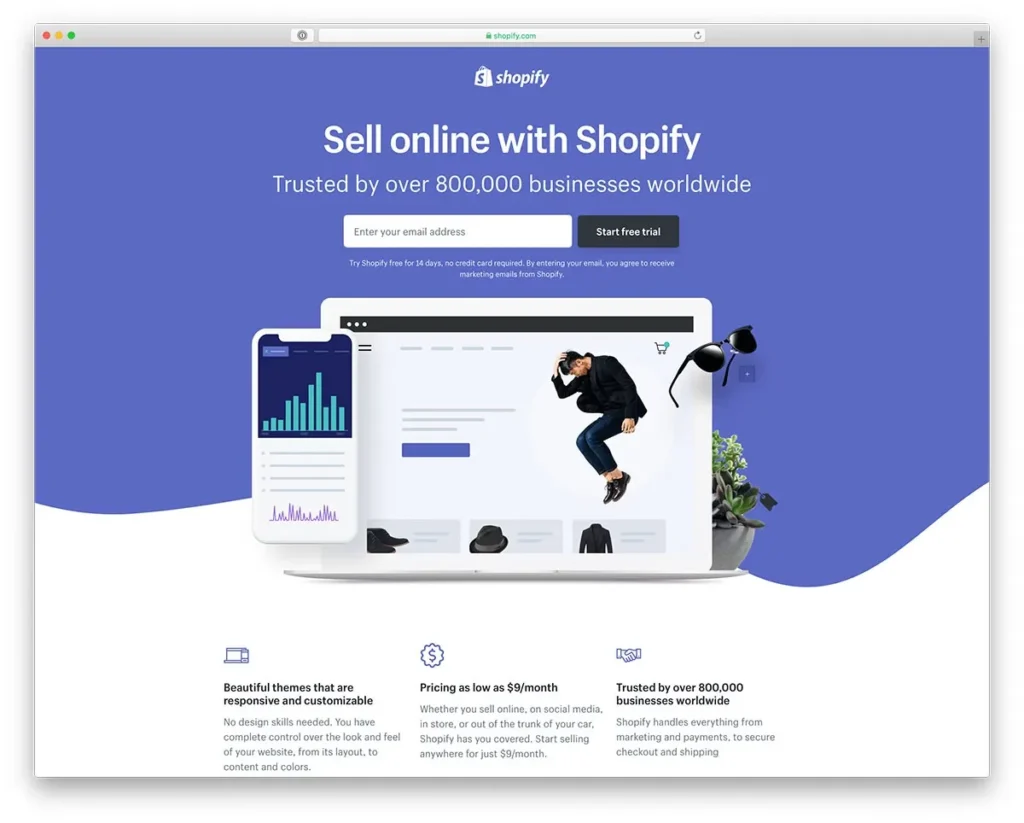
Shopify is a robust all-in-one eCommerce platform that gives you complete control over your online store. While it requires a bit more technical setup, Shopify offers unparalleled customization, a vast app store for extended functionality, and excellent tools for building your brand and scaling your business. If you’re serious about eCommerce and want a platform that can grow with you, Shopify is an excellent choice.
- Best for: Entrepreneurs who want full control over their branding and customer experience. Ideal for scaling your digital product business and selling a wide range of products.
- Pros: Highly customizable, robust app store for added functionality, excellent for building an email list and creating a loyal customer base.
- Cons: Monthly subscription fee, requires more technical setup compared to some other platforms.
3: Etsy
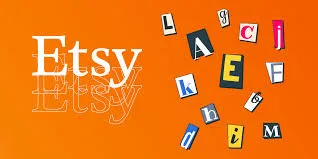
Etsy is a bustling online marketplace known for its unique, handcrafted, and vintage goods. But it’s also a great platform for selling digital products with a “handmade” or artistic flair.
Pros:
- Massive audience: Tap into Etsy’s huge community of shoppers actively seeking unique items.
- Strong community: Connect with fellow creators and benefit from a supportive environment.
- Easy to use: Etsy’s platform is user-friendly, making it simple to list and manage your products.
- Established trust: Etsy has a strong reputation and built-in trust among buyers.
Cons:
- Transaction fees: Etsy charges listing fees and takes a percentage of each sale.
- Competition: Etsy is a competitive marketplace, so standing out requires effort.
- Limited branding control: Your store is within Etsy’s framework, limiting branding customization.
If you create digital products with a handcrafted feel, like printables, graphics, or artistic templates, Etsy’s vibrant marketplace can be a valuable platform to reach a wide audience.
4. Gumroad
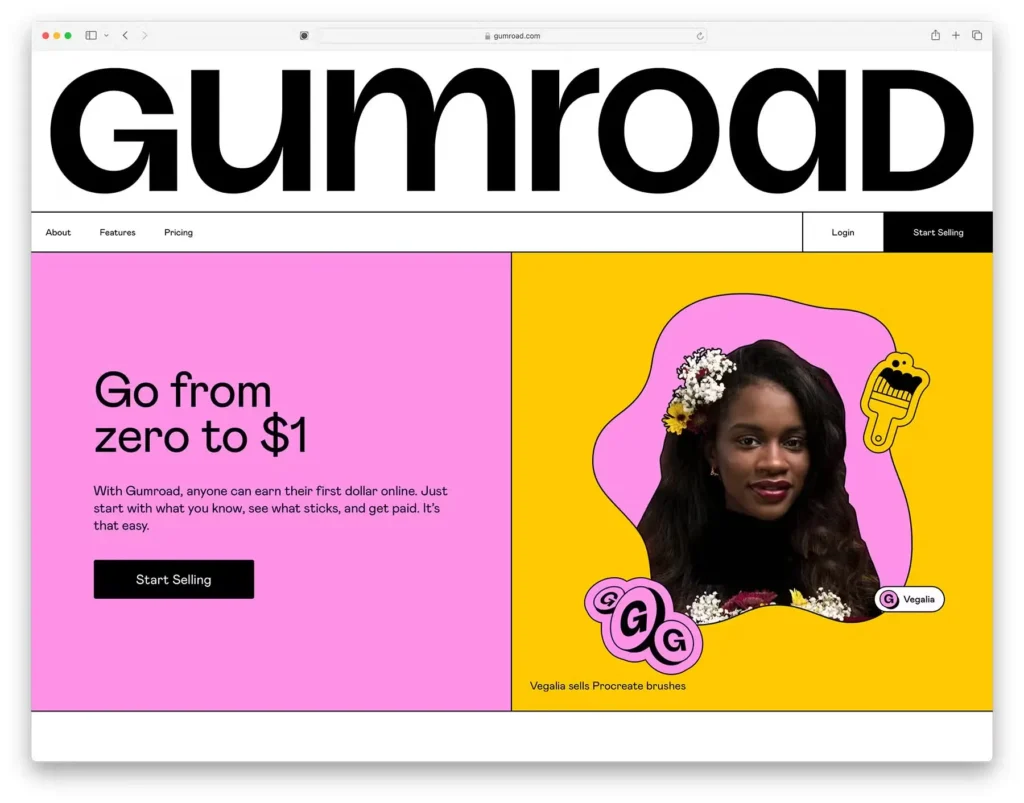
Gumroad is a platform built for creators who want to sell directly to their audience. Its simplicity and focus on empowering creators make it a popular choice for selling digital products like ebooks, music, courses, and software.
Pros:
- Simple and intuitive: Gumroad is incredibly easy to use, even for those with no prior experience selling online.
- Direct connection with your audience: You own your audience data and can build relationships with your customers.
- Flexible pricing options: Offer memberships, subscriptions, and even license keys for software.
- Easy embedding: Embed “buy buttons” and product previews directly on your website or social media.
Cons:
- Limited discoverability: Gumroad relies heavily on your existing audience, as it has less built-in discoverability compared to marketplaces.
- Fewer design customizations: Customization options for your storefront are more limited compared to platforms like Shopify.
If you have a strong online following and want a hassle-free way to sell directly to your fans, Gumroad is an excellent option.
5: Podia
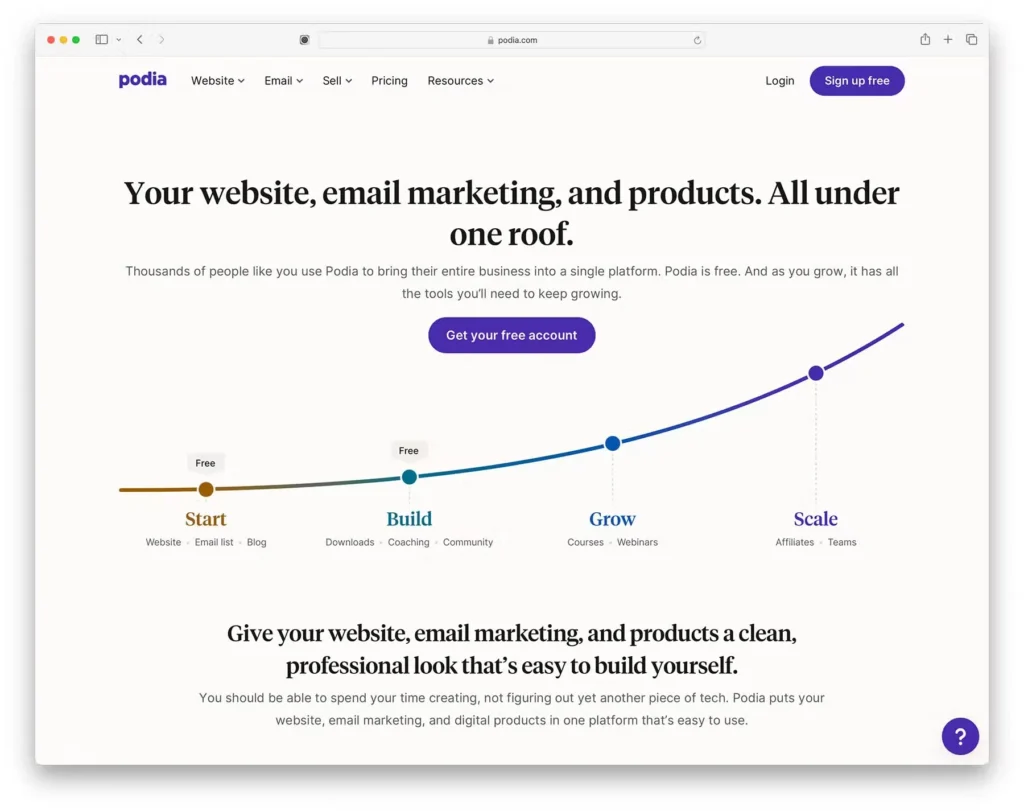
Podia offers a comprehensive solution for creators and entrepreneurs looking to sell online courses, memberships, and digital downloads.
Pros:
- All-in-one platform: Host, market, and sell your digital products all in one place.
- Easy-to-use interface: Create and manage your products with ease.
- Built-in email marketing: Nurture your audience and promote your offerings.
- Strong community features: Build a loyal following and foster engagement.
- Excellent customer support: Get assistance when you need it.
Cons:
- Pricing: Can be more expensive than some other options.
- Customization limitations: Less flexibility for extensive website design customization.
Podia is a great choice if you’re looking for a user-friendly platform with integrated tools for selling a variety of digital products and building a thriving online community.
6: Creative Market
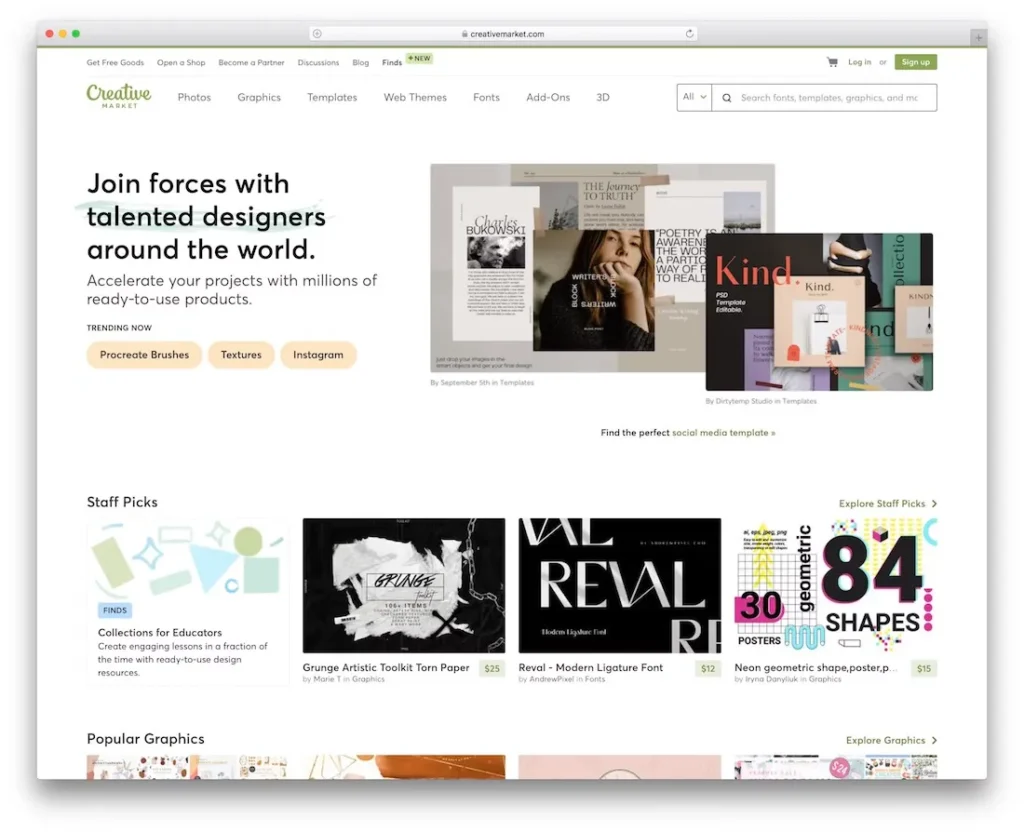
Creative Market is a thriving online marketplace connecting creators with a passionate community of digital asset buyers. It’s a fantastic platform for both finding high-quality design resources and selling your own creations.
Pros:
- Curated marketplace: Discover a wide variety of unique, high-quality fonts, graphics, templates, and more.
- Strong community: Connect with fellow creatives, get inspired, and find support.
- Good discoverability: Increase your reach and get your products seen by a large audience.
Cons:
- High commission fees: Creative Market takes a significant percentage of each sale.
- Competitive landscape: Stand out from the crowd with exceptional products and marketing.
- Strict approval process: Ensure your products meet their quality standards before listing.
If you’re a graphic designer, illustrator, or photographer looking to buy or sell top-notch design assets, Creative Market is the place to be.
7: Teachable
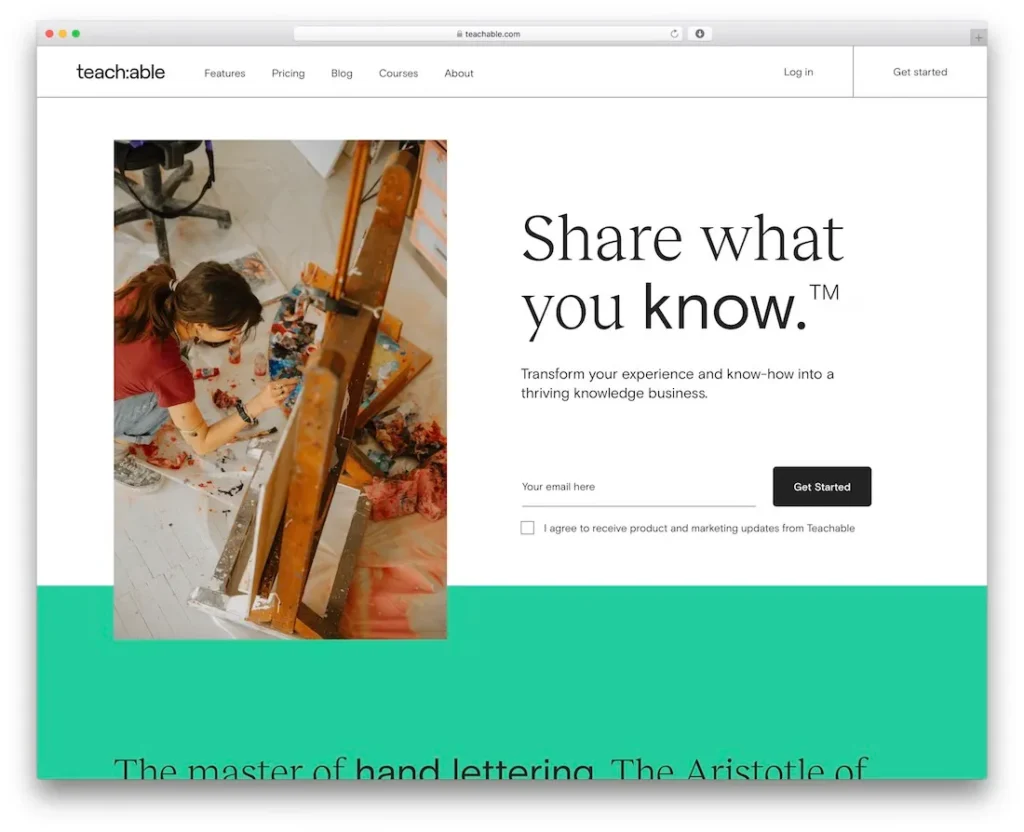
Teachable is a popular platform for creating and selling online courses. Its user-friendly interface makes it easy to structure your curriculum, upload content, and engage with students. While the focus is on educational content, Teachable also supports memberships and coaching services.
Pros:
- Intuitive course creation: Easily build and organize your online courses.
- Engaging learning experience: Add quizzes, discussions, and certificates to enhance learning.
- Marketing and sales tools: Promote your courses with coupons, bundles, and email marketing.
- Student management: Track student progress and communicate with your audience.
Cons:
- Limited website customization: Design options for your website are somewhat restricted.
- Transaction fees on some plans: Be mindful of potential transaction fees depending on your chosen plan.
If you’re passionate about sharing your knowledge and building an online learning community, Teachable provides the tools to bring your vision to life.
8: Thinkific

Thinkific is a robust and user-friendly platform specifically designed for creating and selling online courses.
Pros:
- Intuitive course creation: Easily build engaging courses with a drag-and-drop interface and multimedia support.
- Customization options: Brand your courses and website to match your unique style.
- Student engagement tools: Foster community and interaction with quizzes, discussions, and certificates.
- Marketing and sales features: Promote your courses with built-in marketing tools and flexible pricing options.
- No transaction fees: Keep more of your earnings with zero transaction fees on paid plans.
Cons:
- Limited website design flexibility: Customization options for your website are somewhat restricted.
- Can be more expensive: Pricing may be higher compared to some other platforms, especially for advanced features.
If you’re serious about creating and selling high-quality online courses, Thinkific provides the tools and features you need to succeed.
9: Sellfy
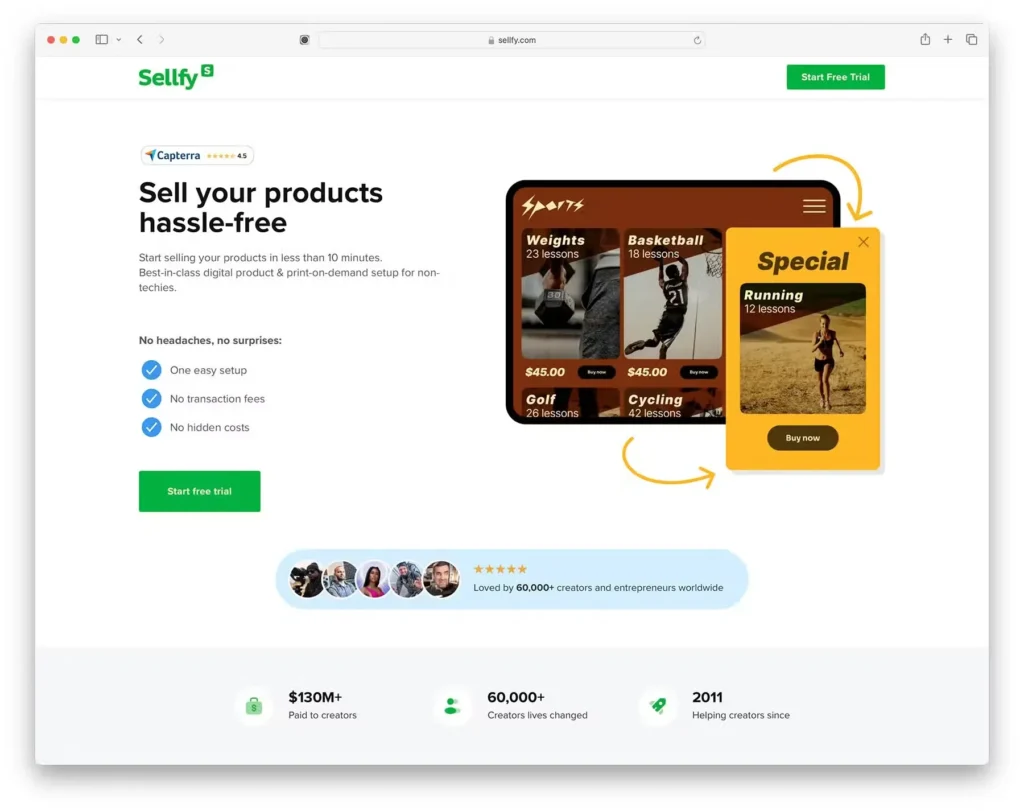
Sellfy shines with its user-friendly approach to selling digital downloads. It’s perfect for creators who prioritize ease of use and quick setup. While customization options are somewhat limited, Sellfy provides all the essentials – secure checkout, marketing tools, and affordable pricing – to get your digital products to market with minimal hassle. If you’re new to selling online or prefer a streamlined experience, Sellfy is a solid choice.
Pros:
- Effortless setup: Get your store up and running quickly with the intuitive interface.
- Affordable pricing: Choose from a free plan or affordable paid plans with no transaction fees.
- Built-in marketing tools: Utilize email marketing, discounts, and upselling to boost sales.
- Secure checkout and file protection: Sellfy handles payments securely and offers features to protect your files.
- Excellent customer support: Responsive support team and helpful resources are readily available.
Cons:
- Limited customization: Store customization options are not as extensive as some other platforms.
- Fewer advanced features: Lacks some advanced eCommerce features found in more robust platforms.
10: Easy Digital Downloads
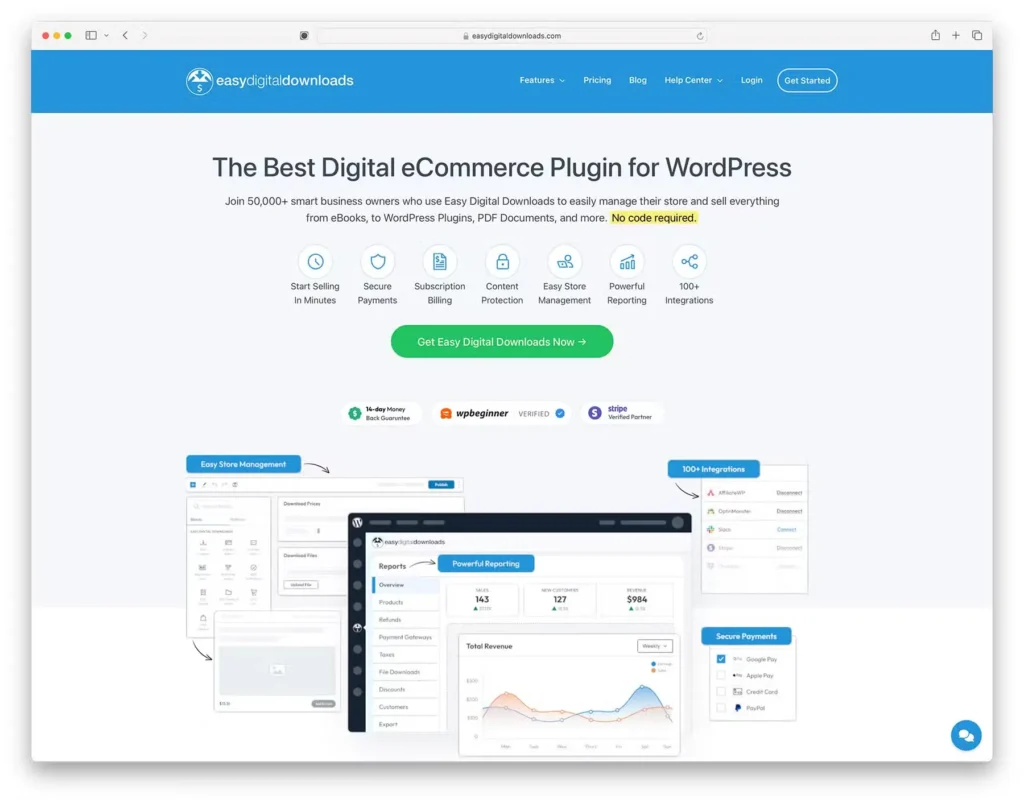
EDD is a robust WordPress plugin specifically designed for selling digital products. It’s a fantastic choice for creators who want a powerful and flexible solution integrated seamlessly with their WordPress website.
Pros:
- WordPress integration: Seamlessly integrates with your existing WordPress site.
- Highly customizable: Tailor your store to your exact needs with themes and extensions.
- Feature-rich: Offers advanced features like software licensing, discount codes, and customer management.
- Strong community: Benefit from a large and active community for support and resources.
- Scalable: Grow your business with EDD’s flexibility and extensive features.
Cons:
- Requires a WordPress website: You need to have a WordPress site to use EDD.
- Can be more complex: The wide range of features may require a learning curve.
- Costs can add up: While the core plugin is free, premium extensions can increase the overall cost.
If you’re a WordPress user serious about selling digital products and want a powerful, customizable solution, Easy Digital Downloads is an excellent choice.
11: SendOwl
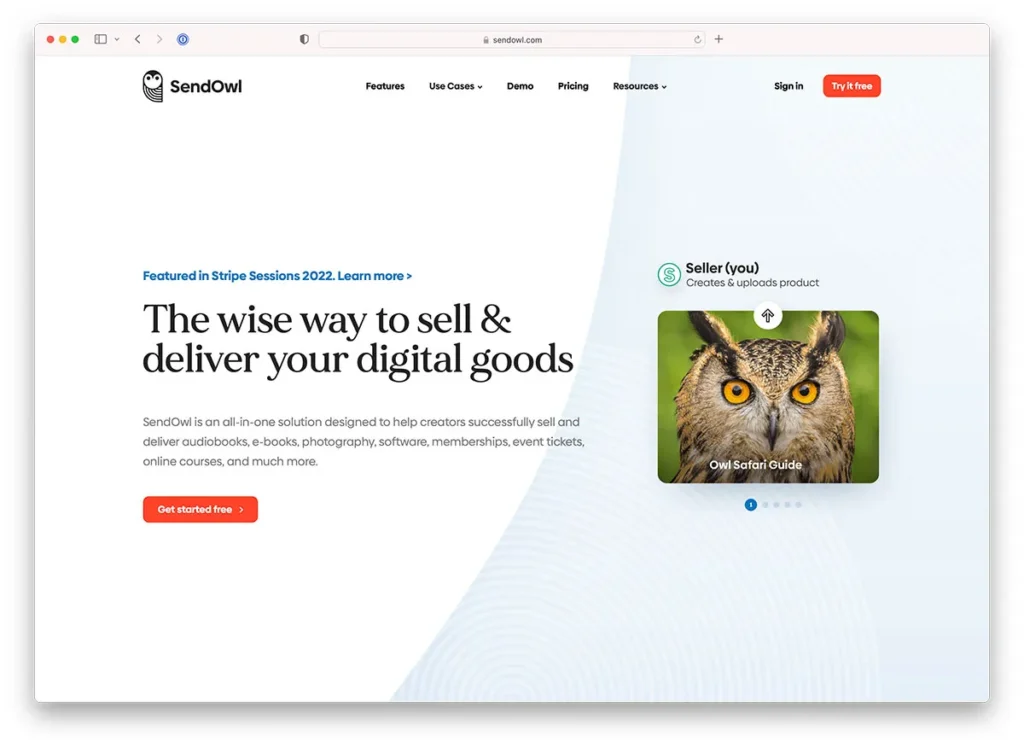
SendOwl focuses on getting your digital products delivered quickly and efficiently. It’s a solid choice for those who prioritize simplicity and don’t need a lot of fancy features.
Pros:
- Fast and easy setup: Get selling in minutes with their straightforward process.
- Affordable: Offers competitive pricing, especially for those with smaller catalogs.
- Strong delivery features: Provides secure downloads, PDF stamping, and various delivery options.
- Good customer support: Helpful resources and responsive support are available.
Cons:
- Limited marketing tools: Fewer built-in marketing features compared to other platforms.
- Basic storefront design: Customization options are limited, impacting branding potential.
If you need a reliable platform focused on secure delivery without the bells and whistles, SendOwl is a good option.
12: PayLoadz
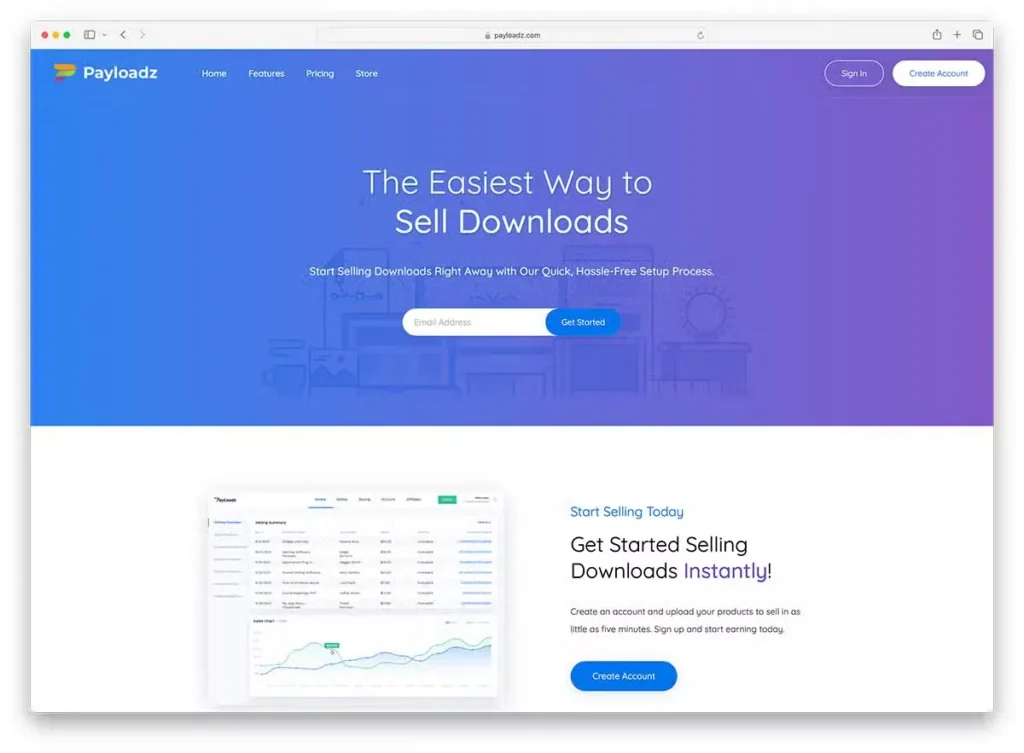
PayLoadz is a no-frills platform focused on delivering your digital goods quickly and easily. It’s a good option if you prioritize simplicity and need a fast solution for selling downloads.
Pros:
- Fast setup: Get started selling in minutes.
- Simple interface: Easy to understand and navigate.
- Affordable: Offers a free plan and low-cost paid options.
- Direct delivery: Automatically delivers products after purchase.
Cons:
- Limited features: Lacks marketing tools and advanced features.
- Basic storefront: Customization options are minimal.
- Higher transaction fees: Compared to other platforms, fees can be higher, especially on the free plan.
PayLoadz is a decent choice for those who need a simple, straightforward solution for selling digital downloads without extra bells and whistles. However, if you’re looking for a platform with more features, marketing tools, and customization options, you might consider alternatives like Sellfy or Gumroad.
13: Payhip
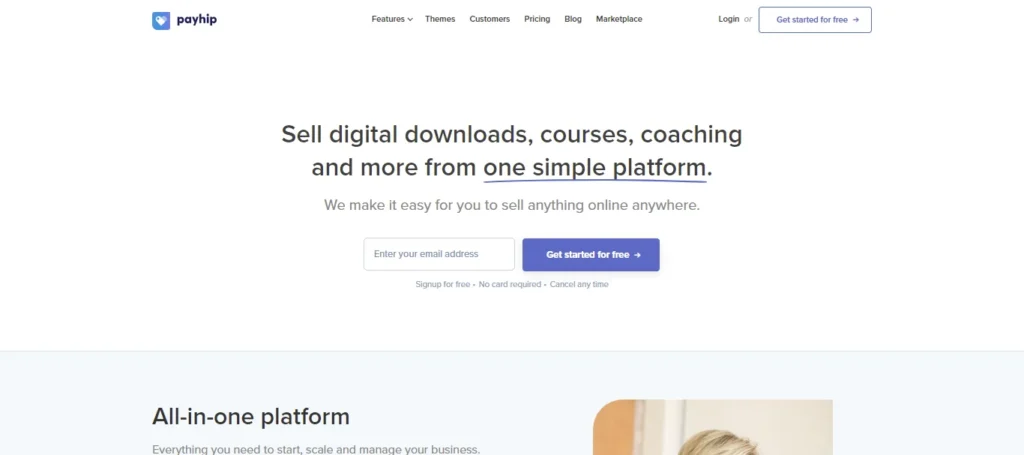
Payhip offers a straightforward platform for selling digital products and memberships. Its clean interface and easy setup make it a good choice for creators looking to sell directly to their audience.
Pros:
- Easy to use: Intuitive interface for quick setup and product listing.
- Direct selling: Sell directly to your audience and build your own brand.
- Multiple product types: Sell digital downloads, memberships, and physical products.
- Marketing features: Utilize coupons, social discounts, and affiliate programs.
- Affordable: Offers a free forever plan and reasonably priced paid plans.
Cons:
- Limited customization: Store customization options are somewhat basic.
- Less discoverability: Relies more on your own marketing efforts to drive traffic.
If you value simplicity and direct selling, Payhip provides a solid platform to get started with selling your digital creations.
14: Printify
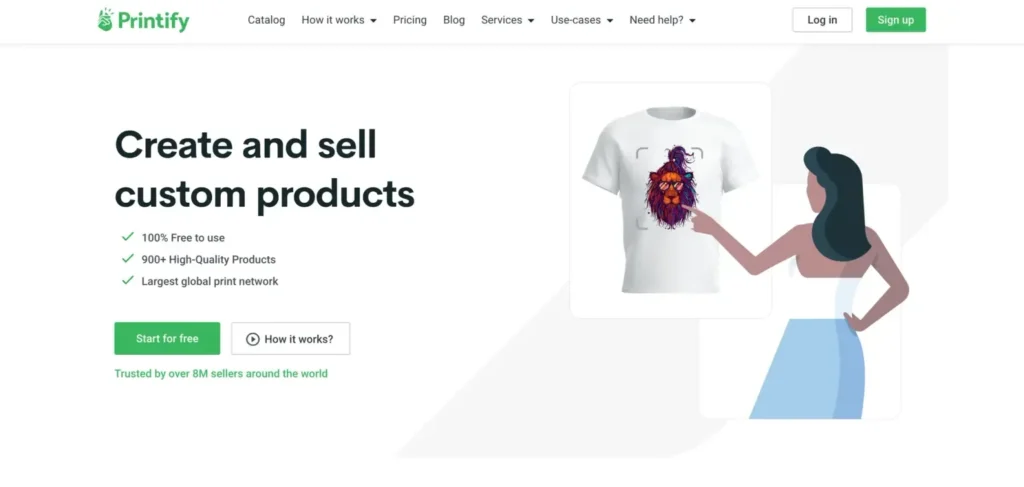
Printify is a fantastic platform for launching a print-on-demand business without the hassle of inventory or upfront costs. With a vast catalog of products and numerous print providers, you have the flexibility to create a unique brand. While quality can vary between providers, Printify’s easy-to-use interface and integrations with popular eCommerce platforms make it a great choice for both beginners and experienced entrepreneurs.
Pros:
- Huge product selection: From t-shirts and mugs to phone cases and home decor, there’s something for everyone.
- Wide range of print providers: Choose from various providers based on location, price, and printing techniques.
- Easy to use: The intuitive design tool and order management system simplify the process.
- No upfront costs: Only pay when a product is ordered.
- Integrates with major platforms: Connect your Printify account to Shopify, Etsy, WooCommerce, and more.
Cons:
- Quality can vary: Product quality depends on the chosen print provider, so it’s crucial to order samples.
- Customer service limitations: Support can sometimes be slow or challenging to reach.
Overall, Printify is a solid option for anyone looking to start a print-on-demand business. Its extensive product catalog, diverse print provider network, and user-friendly interface make it a valuable tool for creating and selling custom products.
15: SquareSpace
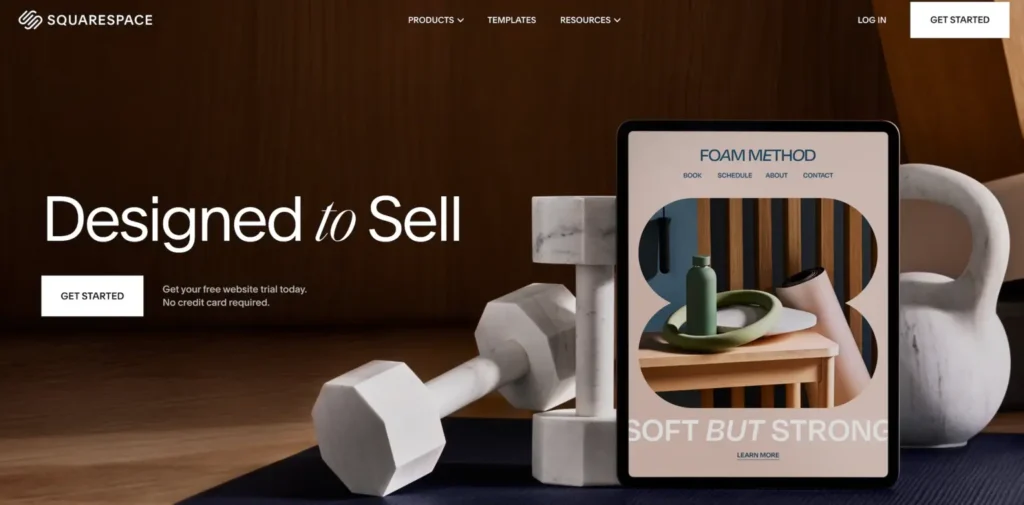
Squarespace is renowned for its beautiful, modern templates and intuitive website building experience. It’s a fantastic option for creatives, businesses, and individuals who want a visually striking online presence without the coding headaches.
Pros:
- Gorgeous templates: Choose from a wide selection of professionally designed templates that are easily customizable.
- Drag-and-drop interface: Building your website is a breeze with the intuitive drag-and-drop editor.
- All-in-one platform: Squarespace provides hosting, domain registration, and all the tools you need in one place.
- Mobile-responsive designs: Your website will look great on any device.
- Strong blogging features: Squarespace offers a robust platform for blogging and content marketing.
Cons:
- Limited app marketplace: Compared to Shopify, Squarespace has fewer apps for extending functionality.
- Pricing: Squarespace plans can be a bit more expensive than some competitors.
If you prioritize aesthetics and ease of use, Squarespace is an excellent choice for creating a stunning website that reflects your brand.
16: RedBubble
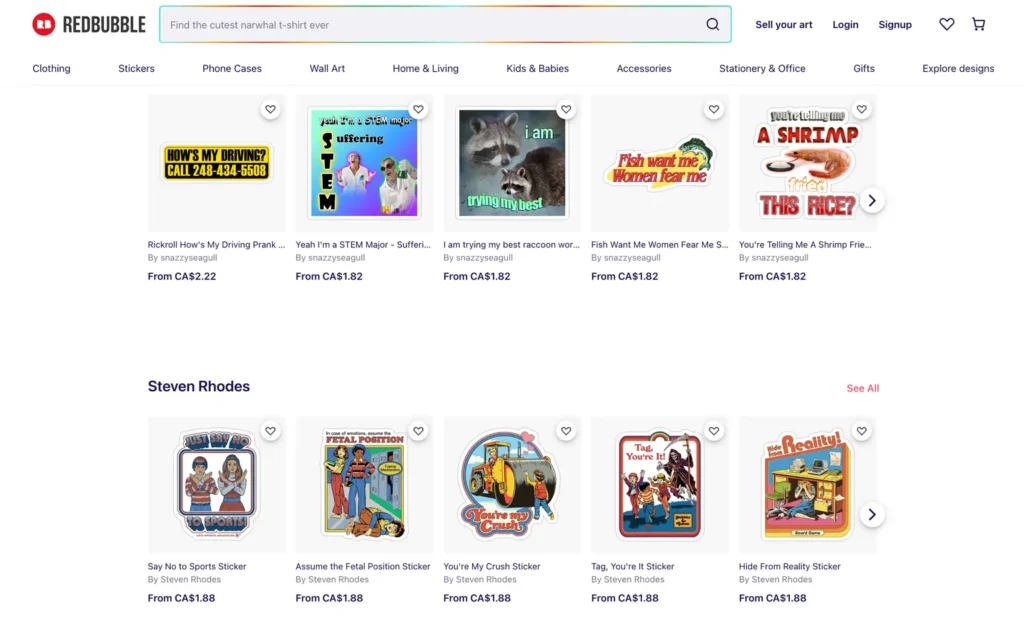
Redbubble is a popular print-on-demand platform that connects independent artists with a global audience. It’s a fantastic option for creators looking to monetize their artwork without managing production or shipping.
Pros:
- Vast product catalog: Offer your designs on a wide variety of items, from apparel and stickers to home decor and phone cases.
- Global reach: Tap into Redbubble’s large and active community of buyers worldwide.
- Passive income potential: Earn money from your art while Redbubble handles production and fulfillment.
- Artist-friendly platform: Set your own margins and retain control over your artwork.
Cons:
- Competition: Stand out from a large pool of talented artists.
- Marketing efforts: Proactive promotion is needed to drive traffic to your Redbubble shop.
- Customer service: Some users report mixed experiences with customer support.
If you’re an artist looking for a hassle-free way to sell your designs on a wide range of products, Redbubble is a great platform to explore.
17: E-junkie
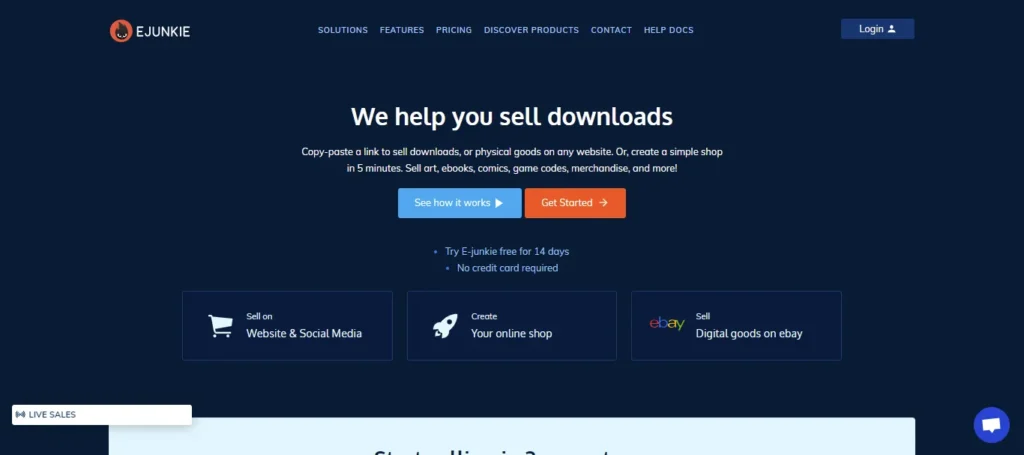
E-junkie is a veteran in the digital product selling space, known for its reliable service and robust features. While its interface might feel a bit dated compared to newer platforms, it offers powerful tools for selling a wide range of digital goods.
Pros:
- Reliable and secure: E-junkie has a long-standing reputation for secure and reliable digital delivery.
- Feature-rich: Offers advanced features like affiliate programs, detailed sales tracking, and flexible purchase options.
- Affordable: Competitive pricing plans with no transaction fees.
- Integrates with various platforms: Easily integrate E-junkie with your existing website or other online platforms.
Cons:
- Dated interface: The user interface might feel less modern compared to newer platforms.
- Steeper learning curve: The abundance of features can make it slightly less intuitive for beginners.
If you prioritize reliability, advanced features, and affordability, E-junkie is a solid choice for selling your digital products.

